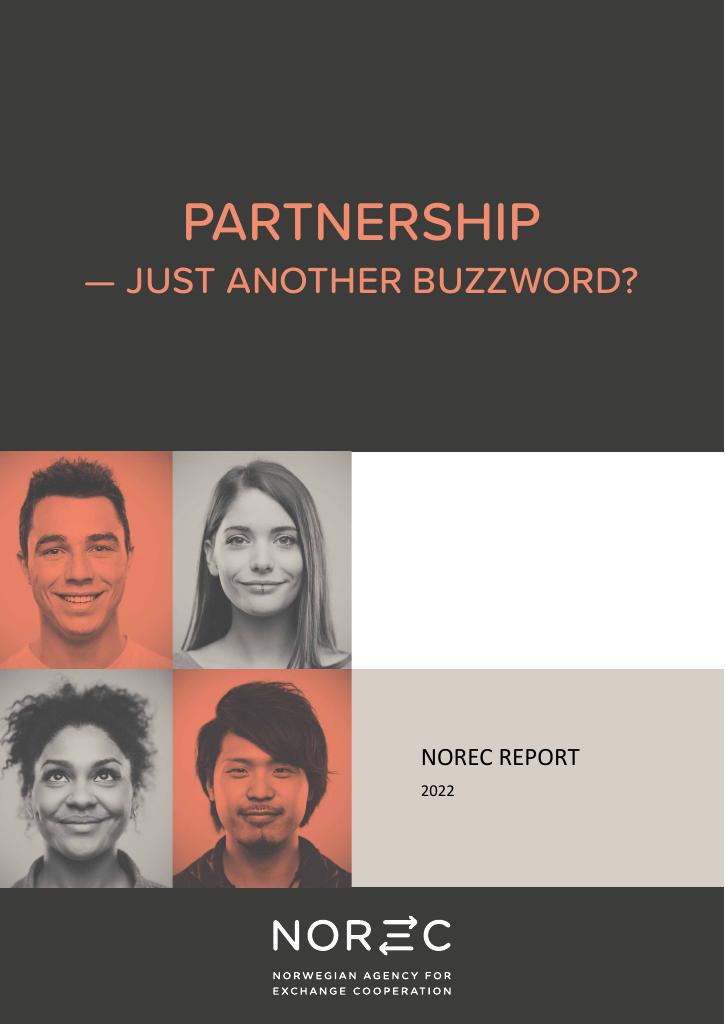Studie
Partnership-just another buzzword?
Development aid expresses a relationship between donor and recipient institutions. From the turn of the millennium this relationship has increasingly been described as a partnership. This concept has never been properly defined. Rather it was framed by a set of principles that could be shared by most development actors and open for context-specific interpretation and use. Partnership is used as a label placed on most aid relations and widely referred to in development policy documents irrespective of what is going on in practice. Such buzzwords thus have the dual function of both concealing (lack of) meaning and disagreement and integrating diverse actors and practice. The partnership concept is central to the Norwegian development policy, but a clear definition cannot be found in public MFA documents investigated in this study. Norec’s guidelines also uses the concept frequently, with an emphasis on the notions of ownership, reciprocity and collaboration, but do not provide any blueprint. Nor do they specify what ownership means, how to operationalize reciprocity and how to build trust. Each Norec exchange programme involves a coordinating partner. The coordinating partner enjoys an elevated position in the exchange partnership by virtue of being responsible for managing the overall dialogue with Norec and being legally and economically accountable. Their resources and capacity to carry out this role varies. Most interviewees however, partners and coordinators alike, not only recognize the coordinators’ elevated role in the partnership, but also claim it as a necessity to get things done, thus effectively questioning the basic idea of equality in the partnership. Therefore, in discussing the partnership concept in Norec’s programmes, particular attention should be given to the role of the coordinating partner how it understands and practices the partnership concept. Long-term commitment were highlighted in the interviews as critical to engendering trust and mutual respect and thus a good partnership. A good Norec partnership is often based on personal relations, and much responsibility for this is placed on the exchange participants. Nupi's turn of the millennium this relationship has increasingly been described as a partnership. development policy documents irrespective of what is going on in practice. Such buzzwords integrating diverse actors and practice. The partnership concept is central to the Norwegian development policy, but a clear Norec's guidelines also uses the concept frequently, with an emphasis on the notions of ownership, ownership means, how to operationalize reciprocity and how to build trust. Each Norec exchange programme involves a coordinating partner. The coordinating partner managing the overall dialogue with Norec and being legally and economically accountable. partners and coordinators alike, not only recognize the coordinators' elevated role in the the basic idea of equality in the partnership. Therefore, in discussing the partnership concept Norec's partner how it understands and practices the partnership concept. personal relations, and much responsibility for this is placed on the exchange participants. Furthermore, the exchanges take place as annual exercises within short- and medium-term institutional agreements. To mitigate these concerns and to increase the partnerships’ sustainability beyond the role of the exchange participants, respondents proposed centering partnerships more on the organization’s and institutional cooperation. The exchange partnerships nominally are about reciprocal teaching and learning. The notion that the exchange projects were about participants from the north going abroad to teach, while those from the south travel to the north to learn, was strong among civil society partnerships, but near absent in private sector partnerships and in exchanges drawing on highly competent, knowledge intensive sectors. Among the private actors interviewed, the focus was more on the added value of cultural exchanges rather than teaching and learning. Most Norec partners pay tribute to the key partnership principles by focusing on ownership, reciprocity, trust, equal participation, and collaboration. This indicates that most partners across various exchange projects largely share understanding of the partnership concept, but the interviews discover greater differences regarding how the interviewees experience it in concreate projects. Most acknowledge thar there is an asymmetry among partners. Few, however, admit that the partnership is an asymmetrical one and that power differences exist within the partnership, despite interviewees referring to practice that suggests otherwise. It thus appears to be a structural discrepancy between what people say on the one hand, and what they do or say they do on the other hand. This, when seen together, may suggest limited awareness among partner institutions to the power dynamics of exchange partnerships.
